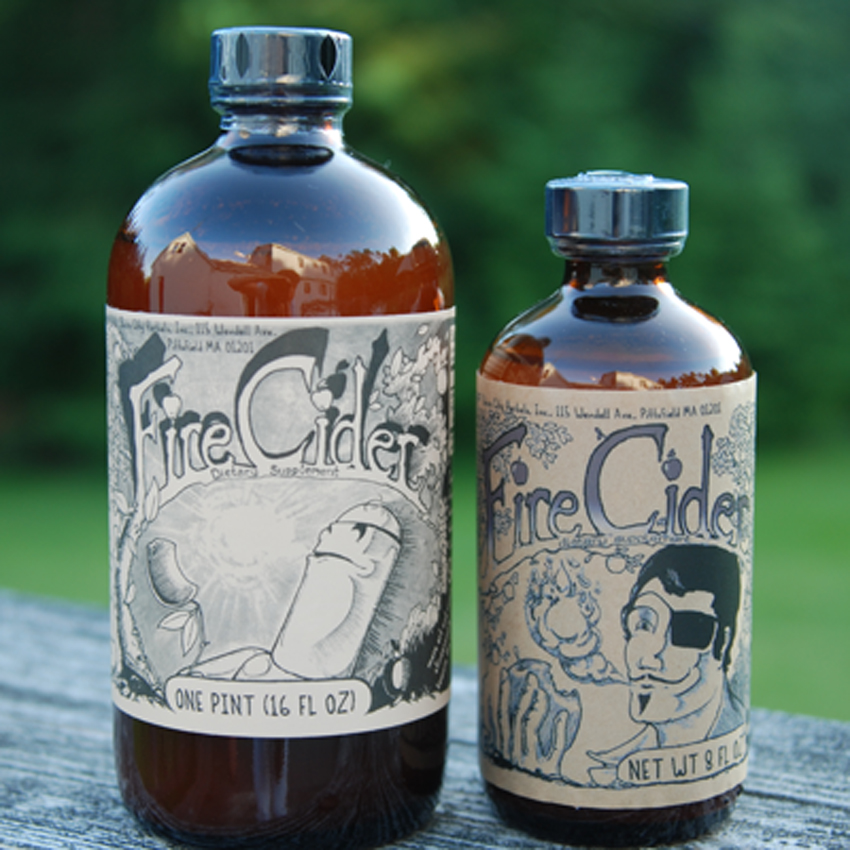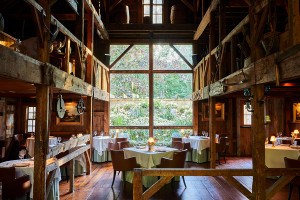Liquid Diet: Introducing Fire Cider, a Health Tonic That Tastes Great with Booze
Welcome to Liquid Diet, where Christopher Hughes finds the extraordinary stories behind the people and places that quench the thirst of the Boston area.

photo courtesy of Fire Cider
As a wine drinker, my first inclination when confronted with a liquid is always to smell what’s in the glass. Sometimes this serves me well (coffee, bourbon, beer) and other times, not so much (fish sauce, suspicious Tupperware at the back of the fridge, eggnog). When I first leaned over a shot of Fire Cider, I instinctively reared back. The pungent aroma of vinegar, raw onion, and spicy horseradish has the sinus-clearing effect of a Neti Pot. But then I tasted it, and the viscous combination of raw apple cider vinegar, raw honey, lemon, orange, and habanero pepper—as well as the savory elements from the onion and horseradish—had an alluring balance of tang, fire, and sharp citrus notes. I immediately went back for seconds.
New England has a long history of combining honey and apple cider vinegar as a natural panacea, but its usage dates as far back as Hippocrates in 400 B.C., when the father of modern medicine prescribed it for a variety of illnesses. Nutritionist Paul Bragg considered it the Holy Grail and credited the elixir with aiding everything from artery plaque to arthritis to athlete’s foot. In one of the more morbid endorsements, Dr. Alexis Carrel, Nobel Laureate in medicine in 1912, kept the cells of a chicken heart alive for 35 years with a steady diet of apple cider vinegar (to give you a point of reference, the average life span of a chicken is 7-8 years). Those thriving chicken heart cells might still be alive today, if Dr. Carrel hadn’t of gotten bored with his own experiment and neglected it.
Fire Cider was officially incorporated in 2011, but founder Dana St. Pierre has been making variations of it since the late 90’s, when a country doctor from Becket, MA told him to drink apple cider vinegar mixed with grated horseradish root to combat severe bronchitis and seasonal allergies. In 2009, when St. Pierre moved back to his childhood home of Pittsfield with his wife Amy Huebner, he was inspired to play around with his original recipe. “That was our first winter back in Berkshire County in ten years, and I was getting sick every six weeks, it seemed like,” says Huebner. “So, [Dana] started making fire cider, which I thought sounded gross— and I’m used to taking weird tinctures and drinking strange teas because I know that food really works with medicine if you’re doing it right. He made up a bunch of different batches and we taste tested them and we decided that this one formula actually tasted good.”
To raise some extra holiday funds, Huebner and St. Pierre whipped up a batch of their new elixir for the Handmade Holiday Festival in downtown Pittsfield, and were shocked by the positive reception. Since then the couple has been traveling to artisan festivals throughout New York and New England, winning over converts and chronicling the more averse reactions into a YouTube video. “Some people really love it the first time they try it,” says Huebner. “Some people feel a bit overwhelmed and get used to it and then they like it. But then there is a small segment of people who say, ‘that’s disgusting! Ew, no.’ They’re almost mad that we asked for them to try it. It’s really fun doing in-person events.”
The Fire Cider website recommends it as a health tonic for a variety of ailments, including heartburn, as a cold and flu fighter, and even as a caffeine substitute. Besides its health benefits, which they emphasize have not been tested by the FDA, Fire Cider has a number of tasty applications in the kitchen, like in their recipes for coleslaw and hot and sour soup. But it’s even more intriguing as fodder for the mixologist crowd. The Red Lion Inn in Stockbridge uses it in their Hot Toddy. John Byrd from Bathtub Gin in New York uses it like bitters in a cocktail with Applejack, Aperol, and grapefruit juice. And The People’s Pint in Greenfield sell shots of Fire Cider as a Beer back.
Schuyler Hunton at Liberty Hotel’s Alibi Bar recently started experimenting with its peculiar appeal, and is cutting the strong vinegar notes and habanero heat with plenty of lime juice and a base of Rhum Agricole, a rum made with sugar cane juice instead of molasses. His newest cocktail is a still-unnamed riff on a spicy caipirinha:
Muddle unrefined sugar and lime juice
Add 1 3/4 oz. Rhum Agricole
1/2 oz. lime juice
1/2 oz. simple syrup
1/2 oz. Fire Cider
Shake and pour into a Collins glass
Top with soda water
If sidling up next to a cure-all at your local pub sounds ridiculous, bear in mind the history of Fernet Branca, which seems to be a veritable skeleton key for that cadre of classic cocktail obsessives. It first became popular during Prohibition since it was imported as a medicinal tonic and avoided the spirits ban. Then it had a mini renaissance in the 1980s as a hangover cure offered by sympathetic bartenders. Now, though, it’s as cozy on the back of the bar as bourbon and Angostura bitters.
Fernet is a herbal digestif that is still regarded more as a tonic for bloating in its home city of Milan. Jeremy Parzen, the author of the fantastic Italian wine blog, Do Bianchi, explained to me that, “Italians see Fernet Branca as something served at the end of a meal to aid in digestion. As an Italian-American, I still view it that way. I can remember being served it at breakfast as a kid.”
All the ingredients in Fire Cider are raw and organic and most of them are sourced locally, like their wildflower honey from Merrimack Valley Apiary. To make large batches, Huebner and St. Pierre use the shared commercial kitchen at the Franklin County CDC, but someday they’re hoping to accrue enough capital to build their own farm where they intend grow everything themselves. But whether you’re using Fire Cider as a cold and flu preventative or as a condiment on your Bloody Mary bar, let me warn you, it’s strangely addictive.
Look for Fire Cider at City Feed and Supply in Jamaica Plain and any Harvest Co-op location. 8 oz. bottle, $14


